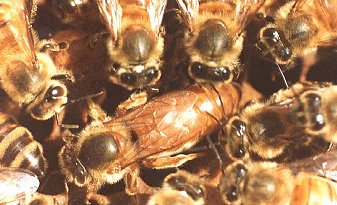Spring activities.
As of early spring, during the warmest days, bees make a purifying flight.
The queen starts to lay some eggs in order to replace the old exhausted winter bees.
Winter bees live from the end of the summer till the beginning of May, whereas workers in summer only live 6 weeks, as already mentioned above.
Bees don’t sleep in winter as wasps and humblebees do. The hive becomes bigger and bigger in order to collect as much honey as possible and to provide the new generation of bees to make it through the winter.
We remind that the activities in winter are very limited!
As from spring, in the summer and even early autumn there is an enormous activity. In that period the queen can lay 1500 eggs every 24 hours.
This amount is necessary to become a strong colony taking into account that every bee lives only 6 weeks. The tasks in the hive are carefully divided. The new born bees maintain the cells, clean and produce wax, while the older bees maintain the nest.
The yet older bees get the nectar and the pollen.
As we already mentioned all depends on the queen.
Queen.
 |
|
A queen can reach the age of 4 years. She is born out of an egg as all other bees. The food she gets makes the difference. The larva which is destined to become a queen receives a special kind of food from the nurse bees: Royal Jelly. The bees decide to “make” another queen when there is for example a lack of space in the hive.
Indeed, it may happen that due to a rapid expansion of the colony during the spring that the hive becomes overcrowded. The workers start then to feed a larva with royal jelly and after 16 days a new queen will be born. Two or more queens in a hive cannot live together. The queen mother, who suspects the birth of new queens, will swarm to avoid being killed by a new born queen.
|
|
|
The oldest queen takes with her a large number of mostly young bees in order to start a new colony elsewhere.
Before leaving the hive, they eat all the honey they can take along not knowing when and where they will find a new home.
